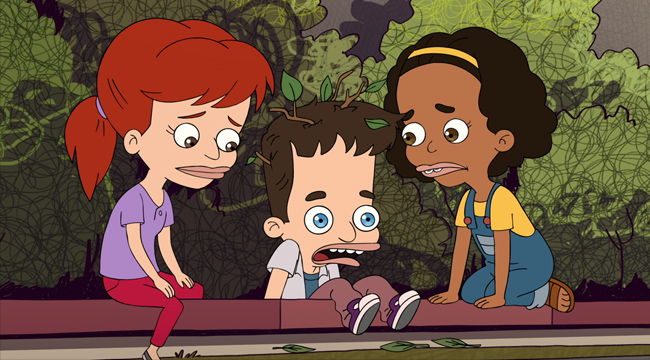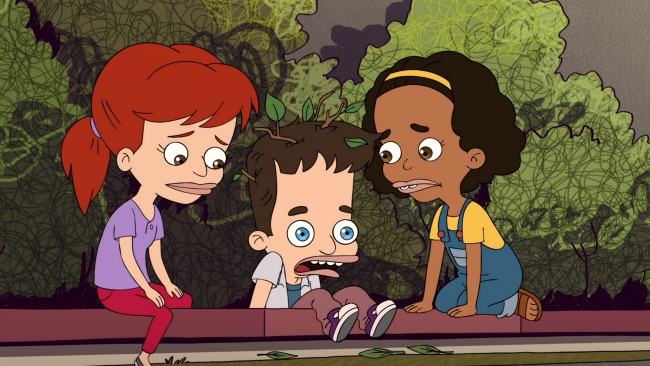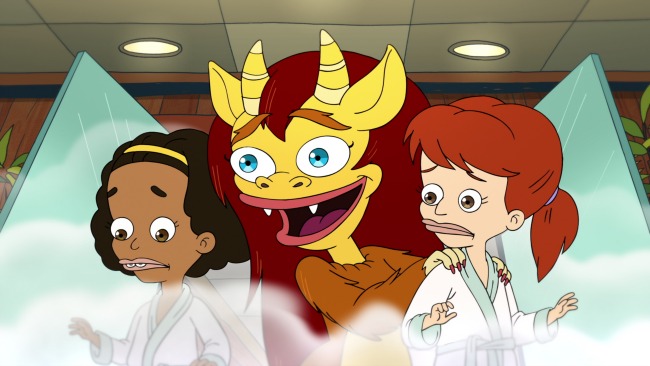
If you’ve seen Big Mouth, then its appeal isn’t a mystery, but actress Jenny Slate pretty much hit the nail on the head when I spoke with her, series co-creator Nick Kroll, and actress Jessi Klein about the just-released second season of the show. “A lot of us, I think, have really direct connections to what these experiences are,” Slate said, adding, “for me, going into season two, it was nice to know that I could be as earnest as I was wild.”
That relatability and that mix are all supercharged going into this new season, and in the interview that follows, Slate, Kroll, and Klein go into detail on the show’s evolution, one of the season’s most unique episodes, and pushing both their own and the audience’s boundaries.
The Planned Parenthood episode could be shown in schools. Letters would come, but did you set out to make a show that had a kind of extra value? I don’t want to say it’s educational, but it’s definitely informative for kids. Even though it’s not a kid’s show.
Jessi Klein: The number of people, strangers, who gush about this show to me, but specifically tell me that they’re watching it with their kids, is remarkable. That they’re watching it with their 12-year-old or 13-year-old or upward. I couldn’t have watched this show with my parents, but it’s a different time. The facts seem to be speaking for themselves to me, in terms of how people say they’re watching it. I think it’s really useful to have something funny that can make everybody laugh, and that’s [also] the entry point for everyone into topics that can be really difficult. I think any time you can lighten them up, as the way in for people, it helps the conversation.
Nick Kroll: I think our intention, first and foremost, is to be funny. And if there are messages that come out of the stories that we tell, then that’s like a huge bonus. And we’re very aware of the messages that we could be sending if there are kids or younger folks watching the show. As far as the Planned Parenthood episode goes, to be honest, this woman, Sue Dunlap, who works for the Planned Parenthood Los Angeles — I believe she’s the CEO — she basically came to a bunch of different writers and producers and said, “It’s wonderful that you guys give money to Planned Parenthood, but it would be really amazing if you guys could tell some stories involving Planned Parenthood.” And we took that as the opportunity to tell stories and figure out what those stories would be around Planned Parenthood, eventually settling on a real kind of, a change in narrative structure from what we normally do with the show in that it’s these five vignettes. And we realized that it would be super fun and exciting to tell a different kind of story and tell five different versions of stories of the different services that Planned Parenthood offered. So, for any number of reasons, it was a real fun departure for us.

I think the show has focussed more on the girl’s side of the story from the end of season one going into season two. Would you agree and was that part of the plan or is it just something that evolved?
Klein: I definitely was really happy with everything that they had installed for Jessi in terms of the journey that she’s on, in balancing out the vibe of the show with getting to see a girl who’s going through stuff that has as much depth and prickly corners to it as the stuff that the guys are dealing with.
Jenny Slate: When you’re talking about puberty and development, in general, there are just sort of limited avenues for what the female experience is and how that is described. And I really enjoy that this show has just given wider margins.
It makes the show that much more impactful.
Slate: Yeah, I think we need it. And it’s also really exciting that that happens through comedy because another thing I think about stories about women or girls and stories about puberty, reproductive justice, whatever, are… because those narratives are so underserved, they’re usually done in more serious venues. This, to me, is something I’m attracted to that it’s like, yeah, these stories belong everywhere just like men’s stories belong everywhere.
Was that a planned evolution?
Kroll: Even though the seed of this show was the relationship with two boys who were at different stages of puberty, the idea was always to tell equal sides both boys and girls, stories of puberty. And it’s something that, over time, and as more real estate became available in the show… as you’re establishing the show, these two best friends were both boys, then as you sort of introduced these other characters (both boys and girls and men and women) that it would give more space and breathing room to tell different kinds of stories. And that was always our intention and always something that we felt was missing… in very crass terms, missing in the marketplace. And I think it’s been very gratifying. Like, I hear from women all the time, “I thought this was gonna be a show about boys jerking off and I wasn’t interested. And then my friend made me watch it and I realized this is as much about my experience as anyone else’s.”
Klein: I feel like it actually was one of those shows that, out of the gate, really had a very strong sense of what it was. Shows often do take time to evolve. I felt like they knew what they wanted it to be and they got it pretty quickly. I think by just leaning in harder to the things they knew they wanted to do, which was to be super funny and super raunchy but also really not shying away from the emotionality of these kids.
A portion of the show is recorded with multiple actors in the room. How important is it to have someone in the room to play off?
Slate: Well, I certainly prefer it. I’m like a real family mouse. I like to be around other people, and it helps me perform when it’s collaborative. So, yeah, it’s something that I really like. And I think that obviously, the script is really, really strong. And I never walk out of a table read being like, “Oh. I hope we’ll punch that up when we get into the booth or something.” It’s always all there. But I think it’s a real luxury to be able to connect to a character, experience a voice-over character as deeply as I connect to Missy and I think that does come from the times when I can be in the booth with other people.
Kroll: So, you know, as much as possible, we get people in the room together. But part of the advantage of doing an animated show is that you can have incredibly busy people who are doing various things, someone like Jenny, who’s got a lot of things going on, that we don’t require her to be there every day all day like we would if it was a live-action show. So sometimes we will get Jenny in the booth a week or two later, but as much as possible, she’s there with me, or she’s there with Mark, who directs from the booth. And that is a give and take in that we’re always trying to have as much of a conversation as possible. The beauty of someone as talented as Jenny is that she can make anything funnier and more natural and nuanced than anybody else.
Slate: Shut up.
See. See how good press days are. All these compliments.
Slate: I know. Our friendship just deepens and deepens.
Kroll: Mm-hmm.
Jessi, you’re not one of the writers, but are there elements to your character that are biographical to you, even if it’s not intentional?
Klein: She’s very much like the way I was slash am. You know, I was like this very nerdy sort of intellectual type girl who kind of shied away from… I was a little more nervous about, I guess just, dating and sexuality and all that stuff always felt hard for me. I leaned harder toward being “I’m smart and funny.” And there are little details, you know, like I did really steal a lipstick. It was my only theft. I know, I’m a terrible person.
This is being recorded.
Klein: You know what? I think the store I stole it from sadly no longer exists, so I feel safe. But I did feel terrible about it. It was just the one lipstick.

Nick, is there any place you’re not comfortable going with the show?
Kroll: The beauty of animation is that there are so many stages and steps to it that you can see how far you can push something and then decide to pull it back or push it forward. I think we’ve been talking about a little bit, the second episode of the season, which is about boobs and the girls, Jessi and Missy, and how they’re feeling because another girl has grown boobs. It’s starting to make them question their own bodies because of how the boys are looking at this girl. And they go to the Korean spa with Missy’s mom and they see all the different types of women’s bodies, including their own bodies. And that they, at some point, feel confident and comfortable enough with their own body to take off their robes and be with all of these nude women. And finding the line of how you can show a 13-year old girl naked on screen and not have it be a sexual thing or sexualize this girl was something that we have been working on. How to do it while being respectful but also in showing that a girl’s body doesn’t have to be a sexualized thing. We were trying to find that line.
Jen Flackett, one of the creators of the show, and Kelly Gulaska, who wrote the episode, at every stage, were kind of advocating for that in a room filled with me, Andrew, and Mark, co-creators, and the animators and character designers who were almost all men. Who are trying to be respectful and in trying to be respectful being like, “Maybe we shouldn’t show these girls because of how it could be interpreted.” And so, just trying to navigate those waters. And it’s really, I think, the women who were advocating for it.
As you move forward with the show, having experiences like that, does it make you want to try to bring more women into the writer’s room and into the conversation?
Kroll: I think, for us, I want the funniest, smartest people in that room. And I want a variety of experiences because I want the best. For me, the best material is that which has the most truthful, honest, and realized lives. And that does mean a variety of points of view, both men and women, and sexual orientation, and race, and everything in between. But, I think our goal was always just to find the smartest, funniest people. And it turns out that it’s, as we should all understand, equally balanced between men and women.
This interview has been edited and condensed from two conversations.






